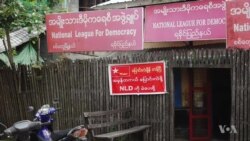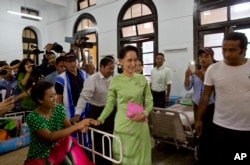In just over a week, the people of Myanmar will head to the polls for what has been celebrated as the country’s first free and fair election in 25 years. But so far, the landmark poll has only brought more suffering for the country’s Rohingya minority, who have been excluded from the electoral process.
Mohammed Jacob lives in a sweltering hot room in the Thet Key Pyin IDP camp. He shares the abode with 13 members of his family. “It's like keeping animals in a cage," he said. "It's not natural.“
Now 71 years old, he is a former tax collector in Sittwe, capital of Myanmar’s Rakhine state. A wave of religious violence that engulfed the coastal region in 2012 forced more than 100,000 Muslims from the persecuted Rohingya minority to be detained in overcrowded and squalid camps.
Voting rights stripped
The Rohingya have taken part in every election since Myanmar — then known as Burma — gained independence in 1948. President Thein Sein stripped the Rohingya of their voting rights earlier this year, claiming that they could not prove their citizenship.
This was a shock for Mohammed, who voted in both the 1990 and 2010 elections. “I was allowed to vote before, but now I am not eligible." he said. "...I’ve lost all hope in the current government.”
Even if they cannot vote the hopes of the Rohingya are pinned on one parliamentary candidate.
“I hope that Aung San Suu Kyi’s party will do a little bit of good for the Rohingya. We don't know what their plans are but I think they could do us some good,” said Maung Ni, a voluntary teacher at the Dar Paing IDP camp.
Aung San Suu Kyi, leader of the main opposition party National League for Democracy, visited Rakhine state earlier this month but avoided campaigning in the northern area where most of her desperate Rohingya supporters live. She also refused to discuss the Rohingya issue when questioned by her audience.
Thankha Kyaw, the NLD’s Rakhine state chairman, denied that this signaled any indifference toward the Rohingya minority, saying instead that time constraints limited the party leader's travels.
However, he did not explain the NLD party's position beyond saying: “When it comes to the camps, the current government has already made long-term plans for [the camp residents'] support and resettlement, which they are now working on.”
Suu Kyi silent
Aung San Suu Kyi, who won the Nobel Peace Prize in 1991, has drawn criticism from the international community for failing to speak out on the plight of Myanmar's persecuted Rohingya. But many in the camps say they understand her desire to appease the domestic electorate.
“She cannot talk about the Rohingya as she is not in power yet," said Mohammed Jacob. "If she speaks openly here, then there is a risk that it will start more religious violence. After the election I think she will talk about the Rohingya.”
Buddhist nationalism is on the rise in Myanmar. Members of the Committee for the Protection of Nationality and Religion, known as the Ma Ba Tha, have become a powerful political lobby and are thought to be behind the government's apparent exclusion of Muslims from the electoral process.
Muslims rejected
As well as revoking Rohingya voting rights, the Union Election Committee also rejected all Muslim parliamentary candidates hoping to contest next week’s election. Eleven successfully appealed that decision.
In Rakhine State, the ethnic Arakan National Party is expected to win a majority of seats, bolstered by strong anti-Muslim and nationalist sentiment.
Sensing that religious hatred is not easing, many Rohingya are considering other options to alleviate their suffering. Mohammed Tahir ran a successful shop in the Nazir quarter of Sittwe before he was moved to Thet Key Pyin camp in 2012. “Nothing good will come of the election," he said. "All of our properties were looted, abandoned or destroyed. Where are we supposed to go?”
Mohammed has attempted to leave Myanmar three times by boat. Rough seas turned him back each time.
Stranded at sea
Earlier this year thousands of Rohingya refugees from Myanmar and Bangladesh were stranded for days in the Andaman Sea without food or water after being abandoned by ruthless traffickers. The United Nations estimates that 370 lost their lives between January and June, but tens of thousands are thought to have made the perilous journey.
As the election season draws to a close, so, too, does the monsoon season. So there are fears that calmer waters will encourage another exodus.
For Mohammed and his 11-strong family, the decision has already been made.
“Many people are waiting on the election," he said. "Once the election is over then we are all going to leave by boat. Right now we are just waiting to make contact with the traffickers.”















